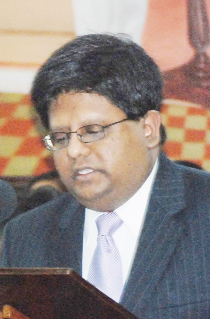The minister was unwilling to disclose much more about the progress the committee was making. President Donald Ramotar had established the committee to examine taxation in Guyana with a view to coming up with a menu of reform measures.
In December, the president identified chartered accountant Ronald Alli, economist Dr Cyril Solomon and businessman Clifford Reis to be members of a panel to review the taxation system. They were to have begun their work soon after the panel was constituted.

Chairman of the Private Sector Commission Ramesh Dookhoo said the private sector was very hopeful about the outcome of the work of the committee. “We have actually submitted two studies to that committee in the hope that they will consider or review such [matters] as tax capacities and our ability to enforce tax laws. We have done another study on PAYE and we are trying to justify a review and a reduction of PAYE,” he said. “This is by no means a lobby for these reports to be taken and made into law, but we have made our civic contribution in terms of being able to represent [our views] on personal income taxes and… other taxes,” he said.
“In our study we tried to justify the reduction of PAYE given where we are now, given where the economy is going. Our study is based on the fact that a growing economy, its dynamism and expansion would mean more tax collected and as a result there can be a possibility of a reduction of the PAYE,” Dookhoo said.
Writing in his Sunday Stabroek column, Professor Clive Thomas said that despite the boasts of the government about the state of the tax system, he believed that it remained in dire need of reform.
“Indeed, I shall argue that these reforms are so deep-seated as to require a far different approach for their resolution than is possible through a Tax Reform Committee made up of persons who are seen as having good working relations with the PPP/C administration over the years, no matter how skilled, proficient and experienced they are,” he wrote.
Dr Thomas described the current tax system as fractured, far too costly, burdensome and inefficient. He called it dysfunctional in relation to promoting economic efficiency, growth, development and welfare, because the deep-seated problems were as much political in nature as technical or economic.
He said the way to overcome this was through the establishment of a broad-based National Commission on Tax Reform.
A draft of the Review of the Tax System, prepared under the GTCP/IP in 2009, said Guyana had high and highly differentiated tax rates on business income, ranging between a 45% rate on commercial companies, 35% on non-commercial companies and 33.3% on unincorporated businesses. It said too that there appeared to be “no compelling economic or equity reasons” for corporate tax rate differences between commercial and non-commercial companies.
The review recommended that the corporate tax rates be lowered and merged at 30% over a five-year period, noting that this would buy time to work on improving general governance and lowering the cost of doing business in Guyana in a complementary fashion to the lowering of corporate tax rates.
The review said, “This will minimise the revenues costs, while giving time for investment planning by business in response to an improved investment climate.” It added that the success of the strategy would depend on the government sticking to its commitments to lower corporate tax rates.
The review noted that the higher tax rates in the corporate sector provided an incentive to conduct business in an unincorporated format rather than as a corporation.





